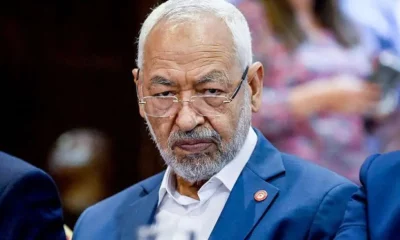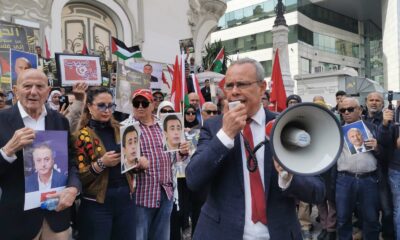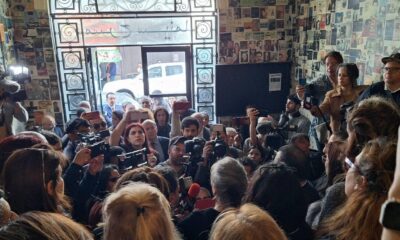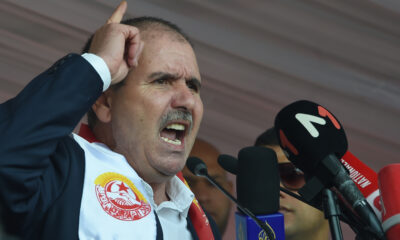Non classé
To prevent the return of the Islamists

- Share
- Tweet /home/clients/157e2baf4f2f57e338044fd02e442b8c/sites/jdd-tunisie.com/wp-content/plugins/mvp-social-buttons/mvp-social-buttons.php on line 71
https://jdd-tunisie.com/wp-content/uploads/2025/03/20200518114632022607.webp&description=To prevent the return of the Islamists', 'pinterestShare', 'width=750,height=350'); return false;" title="Pin This Post">
After the appointment of Mehdi Jomaa as head of government following the conclusions of the national dialogue, Rached Ghannouchi, leader of the Ennahdha movement, declared: “We have left the government, but not power.” This statement encapsulates the strategy adopted by the Islamist movement in its management of successive governments in Tunisia.
Ennahdha has long exerted significant influence on the Tunisian political scene, particularly through its control of the Assembly of the Representatives of the People (ARP). Even after losing its majority in the 2014 elections, the movement quickly succeeded in fragmenting the Nidaa Tounes party, regaining political initiative and reducing Prime Minister Youssef Chahed to a hostage-like status. Following the 2019 elections, Ennahdha allied itself with Nabil Karoui, despite having demonized him during the electoral campaign, thereby consolidating its grip on the political landscape.
However, July 25, 2021, marked a decisive turning point. On that day, President Kaïs Saïed took exceptional measures, ending Ennahdha’s influence and initiating dozens of legal proceedings against its leaders, who were implicated in terrorism and financial corruption cases. This decision put an end to a decade often described as “dark” by its critics, during which Ennahdha governed in alliance with human rights actors and “democracy” advocates, while being accused of undermining the foundations of the state.
Today, Ennahdha is seeking to return to the forefront, cooperating with groups such as the October 18 coalition and with the support of certain embassies, particularly those of the United States and the European Union. The movement has heavily invested in communication campaigns in Europe, Turkey, and Qatar, capitalizing on development issues for which it is partly responsible.
In light of this situation, it is essential, according to observers, to prevent Ennahdha’s potential return by engaging in a thorough dialogue with the forces supporting July 25, as well as with intellectuals and the Tunisian elite. Critics emphasize that the movement, often accused of promoting a religious state project, uses democratic rhetoric as a tool of manipulation, as evidenced by its past support for events in Syria.
Despite its declarations in favor of national dialogue, Ennahdha remains perceived by many as an actor seeking to impose a religious agenda, far from republican principles. Vigilance is therefore crucial to prevent the movement’s resurgence under the pretext of defending democracy.

-

 A la une4 أشهر ago
A la une4 أشهر agoالقضاء يأذن بالتحقيق في وفاة الطبيب زكرياء بوقرة
-

 A la une5 أشهر ago
A la une5 أشهر agoحتى لا يعود الأخوان !
-

 A la une3 أشهر ago
A la une3 أشهر agoتونس: أحكام بالسجن تصل إلى 66 عاماً في قضية “التآمر على أمن الدولة”
-

 A la une4 أشهر ago
A la une4 أشهر agoجبهة الخلاص الوطني تنظّم وقفة احتجاجية للمطالبة بإطلاق سراح المعتقلين السياسيين
-

 A la une4 أشهر ago
A la une4 أشهر agoالمعارضة الضعيفة لا تعني السلطة القوية: محاولة في فهم المشهد السياسي الراهن
-

 A la une4 أشهر ago
A la une4 أشهر agoأفريقيا.. هل تصبح سلة غذاء العالم؟
-

 A la une4 أشهر ago
A la une4 أشهر agoالسلطات التونسية تمنع تظاهرة حول “المحاكمة العادلة” بدعوى الترخيص
-

 الأخبار5 أشهر ago
الأخبار5 أشهر agoأزمة الاتحاد العام التونسي للشغل والسلطة: صراع يؤجج الأزمات ويُعقّد المشهد السياسي